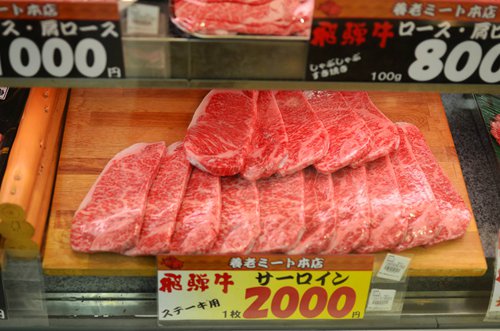SOURCE / INDUSTRIES
China ends ban on Japanese beef
Move to boost Japan’s stumbling exports: experts

Several cuts of Japanese beef shown at a market. Photo: IC
China has lifted an embargo of almost two decades on Japanese beef, amid Japan's stumbling export outlook. The move indicates warming economic relations between the two countries as China's growing market is expected to boost Japan's trade in farm goods, according to experts.Japanese exports of beef to China have been banned since 2001 due to an outbreak of mad cow disease, according to information from China's General Administration of Customs (GAC). The end of the ban, which took effect on Thursday, allows imports of deboned beef from cows under 30 months old, according to a GAC notice.
The decision comes amid Japan's export slump, which has persisted for 12 months. The figure in November showed a 7.9 percent year-on-year fall, according to statistics from Japan's Ministry of Finance.
"While the slump in exports is largely attributed to the decline in the auto sector, China's huge market potential for farm goods may provide a much-needed boost to Japan overall trade," Feng Wei, a professor specializing in Sino-Japanese relations at Fudan University, told the Global Times on Monday.
China is one of the biggest beef importers with increasing demand from its rising middle class. Its beef imports jumped 53.4 percent year-on-year in the first three quarters of 2019, according to the Ministry of Commerce.
In the first eight months of 2018, China's major sources of beef included Brazil, Uruguay, Australia and Argentina, according to information from the research company beeftochina.com.
Japan is rapidly expanding its beef exports. Its total exports of chilled and frozen beef reached 3,799 tons in 2018, breaking a six-year record. The government has also raised its forecast for farm and food exports to $9.1 billion in 2019 from $8.29 billion in the year prior, and the figure is expected to reach $45.7 billion in 2030, according to a report by nikkei.com.
"China's growing demand for high-quality farm products will present Japanese farmers with enormous economic opportunities, especially given China's short-term meat shortage caused by African swine fever," Feng said.
China has been gradually opening its door to Japanese farm products. In November last year, China lifted its ban on rice imports from central Japan's Niigata Prefecture, ending a ban that was imposed after the nuclear disaster in Fukushima Prefecture in 2011.
"Beef and rice production are among the most protected sectors in Japan, along with the production of sugar, wheat and pork. These items are directly linked to the interests of farmers," Chen Yan, executive director of the Japanese Corporations Research Institute, told the Global Times.
Feng added that during Japan's Prime Minister Shinzo Abe's upcoming trip to China, more discussion covering regional trade, including farm products, can be expected, as Japan is trying to expand its agricultural export sector.
Abe is scheduled to take part in the 8th Japan-China-South Korea trilateral summit in Chengdu, capital of Southwest China's Sichuan Province, on Tuesday.
